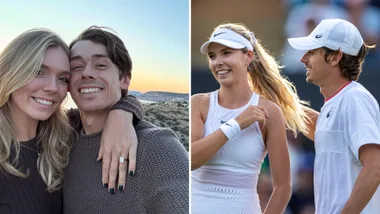Exclusive extract from Certain Girls by Jennifer Weiner.
When I was a kid, our small-town paper published wedding announcements, with descriptions of the ceremonies and dresses and pictures of the brides. Two of the disc jockeys on one of the local radio stations would spend Monday morning picking through the photographs and nominating the Bow-Wow Bride, the woman they deemed the ugliest of all the ladies who’s taken their vows in the Philadelphia region over the weekend. The grand prize was a case of Alpo. I heard the disc jockeys doing this on my way home from the dentist’s office one morning — “Uh-oh, bottom of page J-6, and yes…yes, I think we have a contender!” Jockey One said, and his companion snickered and replied, “There’s not a veil big enough to hide that mess.” “Wide bride! Wide bride!” Jockey One chanted before my mother changed the station back to NPR with an angry flick of her wrist. After that, I became more than a little obsessed with the contest. I would pore over the black-and-white head shots each Sunday morning as if I’d been quizzed on them later. Was the one in the middle ugly? Worse than the one in the upper-right-hand corner? Were the blondes always prettier than the brunettes? Did being fat automatically mean you were ugly? I’d rate the pictures and fume about how unfair it was, how just being born with a certain face or body could turn you into a punch line. Then I’d worry for the winner. Was then dog food actually delivered to the couple’s door? Would they return from the honeymoon and find it there, or would a well-meaning parent or friend try to hide it? How would the bride feel when she saw that she’d won? How would her husband feel, knowing that he’d chosen the ugliest girl in Philadelphia on any given weekend, to love and to cherish, until death did them part?
I wasn’t sure of much back then, but I knew that when — if — I got married, there was no I’d put a picture in the paper. I was pretty certain, at thirteen, that I had more in common with the bow-wows than the beautiful brides, and I was positive that the worst thing that could happen to any woman would be winning that contest.
Now, of course, I know better. The worst thing would be not be a couple of superannuated pranksters on a ratings-challenged radio station oinking at your picture and depositing dog food at your door. The worst thing would be if they did it to your daughter.
I’m exaggerating, of course. And I’m not really worried. I looked across the room at the dance floor, just beginning to get crowded as the b’nai mitzvah guests dropped off their coats, feeling my heart lift at the sight of my daughter, my beautiful girl, dancing the hora in a circle of his friends. Joy will turn thirteen in May and is, in my own modest and completely unbiased opinion, the loveliest girl ever born. She inherited the best things I had to offer – my olive skin, which stays tan from early spring straight through December, and my green eyes. She also has my ex-boyfriend’s good looks: his straight nose and full lips, his dirty-blond hair, which, on Joy, came out as ringlets the deep gold of clover honey. My chest plus my ex-boyfriend Bruce’s skinny hips and lean legs combined to create the kind of body I always figured available only thanks to divine or surgical intervention.
I walked to one of the three bars set along the edges of the room and ordered a vodka and cranberry juice from the bartender, a handsome young man looking miserable in a ruffled pale blue polyester tuxedo shirt and bell-bottoms. At least he didn’t look as tormented as the waitress beside him, in a mermaid costume, with seashells and fake kelp in her hair. Todd had wanted a retro ‘seventies’ theme for the party celebrating his entry into Jewish adulthood. His twin sister, Tamsin, an aspiring marine biologist, hadn’t wanted a theme at all and had grudgingly muttered the word “ocean” the eleventh time her mother had asked her. In between preparty visits to Dr. Hammermesh to have her breasts enlarged, her thighs reduced, and the millimeters of excess flesh between her eyes eliminated, Shari Marmer, the twin’s mom, had come up with a compromise. On this icy night in January, Shari and her husband, Scott, were hosting three hundred of her nearest and dearest at the National Constitution Center to celebrate at Studio 54 Under the Sea.
I passed beneath a doorway draped with fake seaweed and strands of dark blue beads and wandered towards the table at the room’s entrance. My place card had my name stenciled in elaborate script on the back of scallop shell. Said shell contained a T&T medallion, for Tasmin and Todd. I squinted at the shell and learned that my husband, Peter, and I would be sitting at Donna Summer. Joy hadn’t picked up her shell yet. I peered at the whirling mass of coltish girls until I saw Joy in her knee-length dark blue dress, performing some kind of complicated line dance, hands clapping, hips rocking. As I watched, a boy detached himself from a cluster of his friends, crossed the room with his hands shoved in his pockets, and said something to my daughter. Joy nodded and let him take her hand as he led her underneath the strobe that cast cool bubbles of bluish light. My Joy, I thought as the boy shifted him weight from foot to foot, looking like he was in desperate need of the bathroom. It isn’t politically correct to say so, but in the real world good looks function as a get-out-of-everything-free card. Beauty clears your path, it smoothes the way, it holds the door open, it makes people forgive you when your homework’s late or you bring the car home with the gas gauge on E. Joy’s adolescence would be so much easier than mine.
Except… except.











